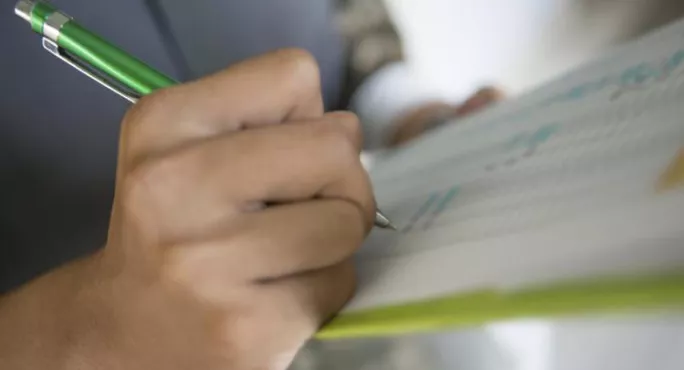Retaining teacher assessments in the marking of GCSEs and A levels would prevent “severe disruption” if exams ever have to be cancelled again, according to a teaching union leader.
Patrick Roach, who has started work as general secretary of the NASUWT, said that coronavirus “won’t be defeated in one fell swoop” and the exams system needed to reflect this.
Such a change would be a marked shift from government policy prior to coronavirus.
Under the new “tougher” GCSEs, assessment in most subjects is by exam only, although due to coronavirus the government has cancelled GCSE and A-level exams for 2020, replacing them with teacher assessments.
Mr Roach suggested that teacher assessments should continue to play a significant role in grading beyond the current academic year.
He said: “The [exam] system has changed over the last decade to focus on terminal examinations to the exclusion of all other forms of assessment.
Related: Analysis: Are teacher-assessed GCSE grades a good idea?
Read: Patrick Roach to be next NASUWT general secretary
Who is Patrick Roach? 7 facts about next NASUWT leader
“I’m not saying we should swing the pendulum back in the direction wholly of teacher assessment or continuous assessment but if you get a bit of balance in the system, we can have confidence.
The impact of coronavirus on GCSEs and A levels
“What would happen if we found ourselves in this position next year or in two or three years’ time [with exams being cancelled]?
“We should be planning for that now so children’s education isn’t as severely disrupted as it has been this time. I think there are lessons from this crisis”
Mr Roach, who takes over from former general secretary Chris Keates today, also said the government needed to make sure that all children have access to broadband and IT equipment, possibly through a voucher scheme.
He said: “That shouldn’t be beyond the realms of possibility. At the moment, the government is rolling out its e-vouchers for free school meals, although it hasn’t quite got there yet.
“These are the things that the government is going to have to give some thought to because with societal disruption, once it’s happened it can always happen again. We thought this was unthinkable but now it’s happened - so we better start thinking about how we anticipate this going forward so that no child gets left behind.”
In an interview with Tes earlier this week, Mr Roach also said broadcasters, social media companies and internet service providers could be providing “a complementary offer” to the work of teachers.
And he called for unions to be included in discussion about when and how schools reopen.
The Department for Education said that it has reformed GCSE, AS and A levels to make them “robust and high-quality”.
It said that, in the new GCSEs, assessment in most subjects is by exam only and that this reduced the “disruption to education” caused when pupils take controlled assessments in the classroom in what could otherwise be teaching time.
It said that in some subjects (eg, art and design) not all skills that are “intrinsic” to the subject can be assessed by exam, so non-exam assessment continues where it is the only valid means of assessing essential skills.
The DfE also said it is considering, with a range of partner organisations, how to improve disadvantaged pupils’ access to online tuition while schools are closed.
It has announced a package of support, including additional funding and high-quality resources to help schools deal with the challenges posed by coronavirus.




